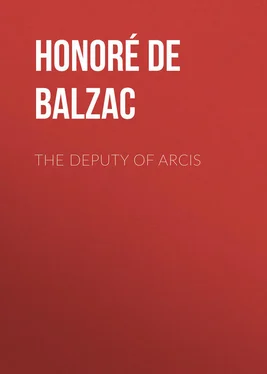Honoré Balzac - The Deputy of Arcis
Здесь есть возможность читать онлайн «Honoré Balzac - The Deputy of Arcis» — ознакомительный отрывок электронной книги совершенно бесплатно, а после прочтения отрывка купить полную версию. В некоторых случаях можно слушать аудио, скачать через торрент в формате fb2 и присутствует краткое содержание. Жанр: literature_19, foreign_antique, foreign_prose, на английском языке. Описание произведения, (предисловие) а так же отзывы посетителей доступны на портале библиотеки ЛибКат.
- Название:The Deputy of Arcis
- Автор:
- Жанр:
- Год:неизвестен
- ISBN:нет данных
- Рейтинг книги:3 / 5. Голосов: 1
-
Избранное:Добавить в избранное
- Отзывы:
-
Ваша оценка:
- 60
- 1
- 2
- 3
- 4
- 5
The Deputy of Arcis: краткое содержание, описание и аннотация
Предлагаем к чтению аннотацию, описание, краткое содержание или предисловие (зависит от того, что написал сам автор книги «The Deputy of Arcis»). Если вы не нашли необходимую информацию о книге — напишите в комментариях, мы постараемся отыскать её.
The Deputy of Arcis — читать онлайн ознакомительный отрывок
Ниже представлен текст книги, разбитый по страницам. Система сохранения места последней прочитанной страницы, позволяет с удобством читать онлайн бесплатно книгу «The Deputy of Arcis», без необходимости каждый раз заново искать на чём Вы остановились. Поставьте закладку, и сможете в любой момент перейти на страницу, на которой закончили чтение.
Интервал:
Закладка:
On the stranger’s return the mistress of the house carried up to him the book in which, according to police regulations, he was required to inscribe his name, rank, the object of his journey, and the place from which he came.
“I shall write nothing,” he said to the mistress of the inn. “If any one questions you, you can say I refused; and you may send the sub-prefect to see me, for I have no passport. I dare say that many persons will make inquiries about me, madame, and you can tell them just what you like. I wish you to know nothing about me. If you worry me on this point, I shall go to the Hotel de la Poste on the Place du Pont and remain there for the fortnight I propose to spend here. I should be sorry for that, because I know that you are the sister of Gothard, one of the heroes of the Simeuse affair.”
“Enough, monsieur,” said the sister of the steward of Cinq-Cygne.
After such a beginning, the stranger kept the mistress of the house a whole hour and made her tell him all she knew of Arcis, of its fortunes, its interests, and its functionaries. The next day he disappeared on horseback, followed by his tiger, returning at midnight.
We can now understand Mademoiselle Cecile’s little joke, which Madame Beauvisage thought to be without foundation. Beauvisage and Cecile, surprised by the order of the day promulgated by Severine, were enchanted. While his wife went to dress for Madame Marion’s reception, the father listened to the many conjectures it was natural a girl should make in such a case. Then, fatigued with his day, he went to bed as soon as his wife and daughter had departed.
As may readily be supposed by those who know anything of country towns, a crowd of persons flocked to Madame Marion’s that evening. The triumph of Giguet junior was thought to be a victory won against the Comte de Gondreville, and to insure forever the independence of Arcis in the matter of elections. The news of the death of poor Charles Keller was regarded as a judgment from heaven, intended to silence all rivalries.
Antonin Goulard, Frederic Marest, Olivier Vinet, and Monsieur Martener, the authorities who, until then, had frequented this salon (the prevailing opinions of which did not seem to them contrary to the government created by the popular will in July, 1830), came as usual, possessed by curiosity to see what attitude the Beauvisage family would take under the circumstances.
The salon, restored to its usual condition, showed no signs of the meeting which appeared to have settled the destiny of Simon Giguet. By eight o’clock four card-tables, each with four players, were under way. The smaller salon and the dining-room were full of people. Never, except on grand occasions, such as balls and fete-days, had Madame Marion seen such an influx at the door of her salon, forming as it were the tail of a comet.
“It is the dawn of power,” said Olivier Vinet to the mistress of the house, showing her this spectacle, so gratifying to the heart of a person who delighted in receiving company.
“No one knows what there is in Simon,” replied the mother. “We live in times when young men who persevere and are moral and upright can aspire to everything.”
This answer was made, not so much to Vinet as to Madame Beauvisage, who had entered the room with her daughter and was now beginning to offer her congratulations on the event. In order to escape indirect appeals and pointed interpretations of careless words, Madame Beauvisage took a vacant place at a whist-table and devoted her mind to the winning of one hundred fishes. One hundred fishes, or counters, made fifty sous! When a player had lost that sum it was talked of in Arcis for a couple of days.
Cecile went to talk with Mademoiselle Mollot, one of her good friends, appearing to be seized with redoubled affection for her. Mademoiselle Mollot was the beauty of Arcis, just as Cecile was the heiress. Monsieur Mollot, clerk of the court, lived on the Grande-Place in a house constructed in the same manner as that of Beauvisage on the Place du Pont. Madame Mollot, forever seated at the window of her salon on the ground-floor, was attacked (as the result of that situation) by intense, acute, insatiable curiosity, now become a chronic and inveterate disease. The moment a peasant entered the square from the road to Brienne she saw him, and watched to see what business could have brought him to Arcis; she had no peace of mind until that peasant was explained. She spent her life in judging the events, men, things, and households of Arcis.
The ambition of the house of Mollot, father, mother, and daughter, was to marry Ernestine (an only daughter) to Antonin Goulard. Consequently the refusal of the Beauvisage parents to entertain the proposals of the sub-prefect had tightened the bonds of friendship between the two families.
“There’s an impatient man!” said Ernestine to Cecile, indicating Simon Giguet. “He wants to come and talk with us; but every one who comes in feels bound to congratulate him. I’ve heard him say fifty times already: ‘It is, I think, less to me than to my father that this compliment of my fellow-citizens has been paid; but, in any case, pray believe that I shall be devoted not only to our general interests but to yours individually.’ I can guess those words by the motion of his lips, and all the while he is looking at you with an air of martyrdom.”
“Ernestine,” replied Cecile, “don’t leave me the whole evening; I don’t want to listen to his proposals made under cover of ‘alases!’ and mingled with sighs.”
“Don’t you want to be the wife of a Keeper of the Seals?”
“Ah! that’s all nonsense,” said Cecile, laughing.
“But I assure you,” persisted Ernestine, “that just before you came in Monsieur Godivet, the registrar, was declaring with enthusiasm that Simon would be Keeper of the Seals in three years.”
“Do they count on the influence of the Comte de Gondreville?” asked the sub-prefect, coming up to the two girls and guessing that they were making fun of his friend Giguet.
“Ah! Monsieur Antonin,” said the handsome Ernestine, “you who promised my mother to find out all about the stranger , what have you heard about him?”
“The events of to-day, Mademoiselle, are so much more important,” said Antonin, taking a seat beside Cecile, like a diplomat delighted to escape general attention by conversing with two girls. “All my career as sub-prefect or prefect is at stake.”
“What! I thought you allowed your friend Simon to be nominated unanimously.”
“Simon is my friend, but the government is my master, and I expect to do my best to prevent Simon from being elected. And here comes Madame Mollot, who owes me her concurrence as the wife of a man whose functions attach him to the government.”
“I am sure we ask nothing better than to be on your side,” replied the sheriff’s wife. “Mollot has told me,” she continued in a low voice, “what took place here to-day – it is pitiable! Only one man showed talent, and that was Achille Pigoult. Everybody agrees that he would make a fine orator in the Chamber; and therefore, though he has nothing, and my daughter has a dot of sixty thousand francs, not to speak of what, as an only child, she will inherit from us and also from her uncle at Mollot and from my aunt Lambert at Troyes, – well, I declare to you that if Monsieur Achille Pigoult did us the honor to ask her to wife, I should give her to him; yes, I should – provided always she liked him. But the silly little goose wants to marry as she pleases; it is Mademoiselle Beauvisage who puts such notions into her head.”
The sub-prefect received this double broadside like a man who knows he has thirty thousand francs a year, and expects a prefecture.
“Mademoiselle is right,” he said, looking at Cecile; “she is rich enough to make a marriage of love.”
Читать дальшеИнтервал:
Закладка:
Похожие книги на «The Deputy of Arcis»
Представляем Вашему вниманию похожие книги на «The Deputy of Arcis» списком для выбора. Мы отобрали схожую по названию и смыслу литературу в надежде предоставить читателям больше вариантов отыскать новые, интересные, ещё непрочитанные произведения.
Обсуждение, отзывы о книге «The Deputy of Arcis» и просто собственные мнения читателей. Оставьте ваши комментарии, напишите, что Вы думаете о произведении, его смысле или главных героях. Укажите что конкретно понравилось, а что нет, и почему Вы так считаете.












